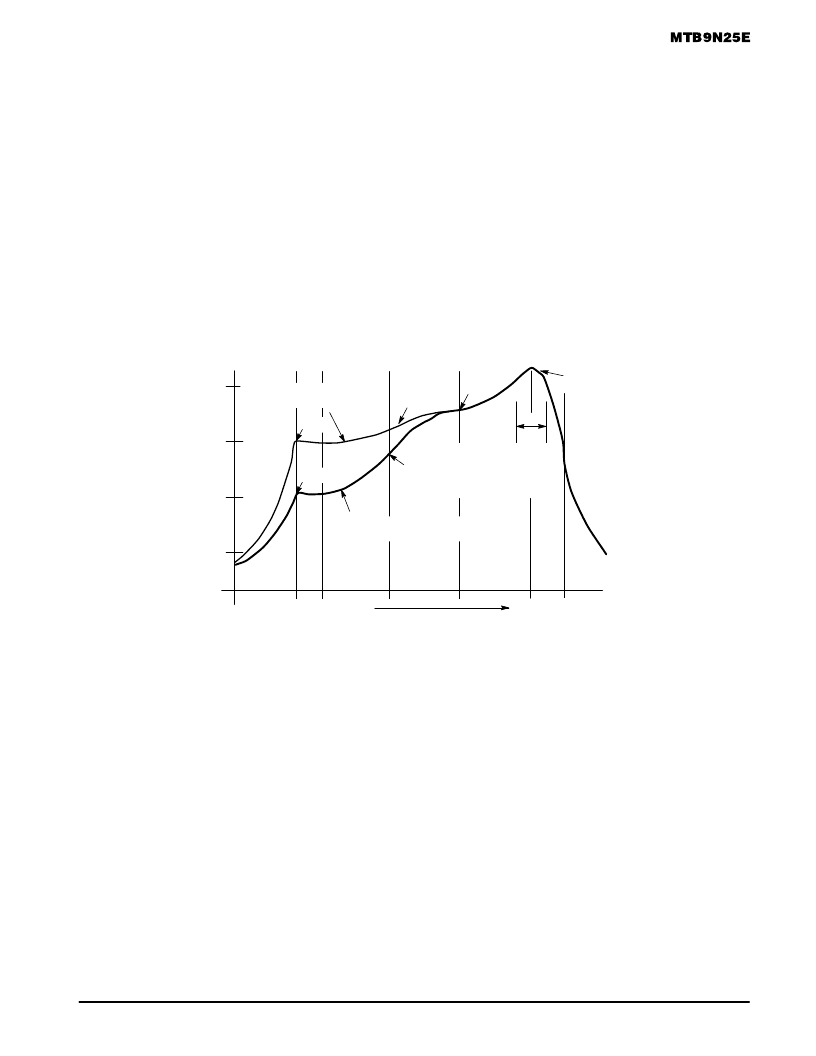- 您現(xiàn)在的位置:買賣IC網(wǎng) > PDF目錄369933 > MTB9N25E (MOTOROLA INC) TMOS POWER FET 9.0 AMPERES 250 VOLTS PDF資料下載
參數(shù)資料
| 型號: | MTB9N25E |
| 廠商: | MOTOROLA INC |
| 元件分類: | JFETs |
| 英文描述: | TMOS POWER FET 9.0 AMPERES 250 VOLTS |
| 中文描述: | 9 A, 250 V, 0.45 ohm, N-CHANNEL, Si, POWER, MOSFET |
| 文件頁數(shù): | 9/10頁 |
| 文件大小: | 258K |
| 代理商: | MTB9N25E |

9
Motorola TMOS Power MOSFET Transistor Device Data
TYPICAL SOLDER HEATING PROFILE
For any given circuit board, there will be a group of control
settings that will give the desired heat pattern. The operator
must set temperatures for several heating zones, and a figure
for belt speed. Taken together, these control settings make up
a heating “profile” for that particular circuit board. On
machines controlled by a computer, the computer remembers
these profiles from one operating session to the next. Figure
18 shows a typical heating profile for use when soldering a
surface mount device to a printed circuit board. This profile will
vary among soldering systems but it is a good starting point.
Factors that can affect the profile include the type of soldering
system in use, density and types of components on the board,
type of solder used, and the type of board or substrate material
being used. This profile shows temperature versus time. The
line on the graph shows the actual temperature that might be
experienced on the surface of a test board at or near a central
solder joint. The two profiles are based on a high density and
a low density board. The Vitronics SMD310 convection/in-
frared reflow soldering system was used to generate this
profile. The type of solder used was 62/36/2 Tin Lead Silver
with a melting point between 177–189
°
C. When this type of
furnace is used for solder reflow work, the circuit boards and
solder joints tend to heat first. The components on the board
are then heated by conduction. The circuit board, because it
has a large surface area, absorbs the thermal energy more
efficiently, then distributes this energy to the components.
Because of this effect, the main body of a component may be
up to 30 degrees cooler than the adjacent solder joints.
STEP 1
PREHEAT
ZONE 1
“RAMP”
STEP 2
VENT
“SOAK”
STEP 3
HEATING
ZONES 2 & 5
“RAMP”
STEP 4
HEATING
ZONES 3 & 6
“SOAK”
STEP 5
HEATING
ZONES 4 & 7
“SPIKE”
170
°
C
STEP 6
VENT
STEP 7
COOLING
200
°
C
150
°
C
100
°
C
50
°
C
TIME (3 TO 7 MINUTES TOTAL)
Figure 18.
TMAX
SOLDER IS LIQUID FOR
40 TO 80 SECONDS
(DEPENDING ON
MASS OF ASSEMBLY)
205
°
TO 219
°
C
PEAK AT
SOLDER JOINT
DESIRED CURVE FOR LOW
MASS ASSEMBLIES
100
°
C
150
°
C
160
°
C
140
°
C
DESIRED CURVE FOR HIGH
MASS ASSEMBLIES
Typical Solder Heating Profile
相關(guān)PDF資料 |
PDF描述 |
|---|---|
| MTD2955V | TMOS POWER FET 12 AMPERES 60 VOLTS RDS(on) = 0.230 OHM |
| MTD2955V | P-Channel Enhancement Mode Field Effect Transistor |
| MTD2N50 | POWER FIELD EFFECT TRANSISTOR N-CHANNEL ENHANCEMENT-MODE SILICON GATE DPAK FOR SURFACE MOUNT OR INSERTION MOUNT |
| MTD6N20E | TMOS POWER FET 6.0 AMPERES 200 VOLTS RDS(on) = 0.7 OHM |
| MTD6P10E | TMOS POWER FET 6.0 AMPERES 100 VOLTS RDS(on) = 0.66 OHM |
相關(guān)代理商/技術(shù)參數(shù) |
參數(shù)描述 |
|---|---|
| MTB9N25ET4 | 制造商:Rochester Electronics LLC 功能描述:- Bulk |
| MTBA5N10J3 | 制造商:CYSTEKEC 制造商全稱:Cystech Electonics Corp. 功能描述:N -Channel Logic Level Enhancement Mode Power MOSFET |
| MTBA5N10Q8 | 制造商:CYSTEKEC 制造商全稱:Cystech Electonics Corp. 功能描述:N -Channel Logic Level Enhancement Mode Power MOSFET |
| MTBB0P10J3 | 制造商:CYSTEKEC 制造商全稱:Cystech Electonics Corp. 功能描述:P-Channel Logic Level Enhancement Mode Power MOSFET |
| MTBB0P10L3 | 制造商:CYSTEKEC 制造商全稱:Cystech Electonics Corp. 功能描述:P-Channel Logic Level Enhancement Mode Power MOSFET |
發(fā)布緊急采購,3分鐘左右您將得到回復(fù)。